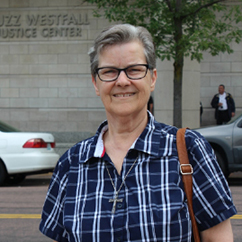Sister Elisa Ryan, OSU

One Sunday a month, Sister Elisa Ryan steps into the Buzz Westfall Justice Center in Clayton, Missouri, and begins the three-step screening process she must undergo before being given access to the women prisoners she ministers to on the fourth floor. She has been doing this since she returned to St. Louis from Rome a decade ago.
“When I came back after 12 years of service with the General Council team, I was given sabbatical time to rest and get back in sync with the U.S. culture and the Central Province,” Sister Elisa says. “I wanted to share the time I’d been given by reaching out to people on the margins, but I didn’t know how I would do it. Then, in the back of a Catholic Workers newspaper, I saw a tiny blurb about prison ministry.” Quickly following up, Sister Elisa soon was training with other volunteers at the St. Louis County Jail. After considering how she wanted to volunteer, Sister Elisa decided on leading prayer sessions.
At any given time, there are about 1,200 male and female prisoners in the county jail. On her Sundays there, Sister Elisa tends to the spiritual needs of a small group of women prisoners—usually 12 to 15—by forming a circle of support and prayer. “An announcement is made that the prayer leader is here and women who want to participate gather in a small classroom,” she says. “The prayer session is not billed as Catholic; everyone is welcome.”
The women begin by introducing themselves, first name only; then Sister Elisa starts things off with some breathing and relaxation exercises. Next she invites the women to bring anyone they want into the circle of prayer by saying their names. At this, she says, “their hearts melt and from this point on they seem fully present.”
Sister Elisa chooses a scripture reading for each visit and invites the women gathered to listen for what touches them. “It’s amazing what happens after that,” she says. “They feel very free to say what touches them and why.”
She says the women she sees usually are at rock bottom, allowing them to share their own vulnerability and recognize the need for God. “I am inspired by them,” she says. “They bring their faith experience from everyday life, and it is so real, so genuine. Once, when I was telling them about Angela and that she had a special concern for women, a woman started to cry.”
The women recognize that being in jail is what they need at the time, Sister Elisa says. “It forces them to slow down, reflect, pray, and begin to get over addiction. All they want is a normal family life again—and maybe for the first time.” She always brings fliers with information about resources they will need when they get out, such as housing, food and counseling. The only other thing she can bring is greeting cards for events such a birthdays, graduation and anniversaries donated by other sisters, which the prisoners greatly appreciate as a way to keep in touch with their families.
Sister Elisa, who has a full-time ministry as vocations director for the Ursulines’ three U.S. provinces, says prison ministry has changed her in many ways. “It grounds me, no matter what I’m doing, to keep coming back to women for whom things have fallen apart. They are recognizing their need to get their life together, admitting they’ve made mistakes, and they know they need to work on it. I want these young women to realize how blessed and how important they are.”
Sister Elisa typically says the groups usually ends the gathering with spontaneous prayer, an Our Father and a sign of peace. The women always thank her for coming, and she tells them she loves to come. “I receive so much more from them than I could ever give them.”
Now in her 10th year of prison ministry, Sister Elisa says that in many ways it has been one of the most gratifying. “Of all ministries, this grounds me into the deepest meaning of it all because I am with people who are truly poor, one way or another,” she says. “Recognizing the cycle of poverty that has brought them there—often beyond their control—makes me more aware of the wide spectrum of people in our society and the need to reach out to those who don’t have the means to help themselves.
“To me, It’s the heart of the gospel.”

